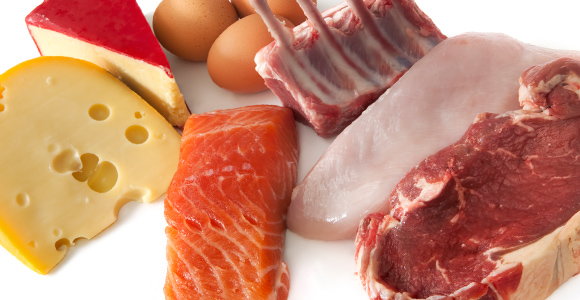With the explosion of high-protein diets like Atkins, South Beach and myriad copycat versions, you may well think that protein is a veritable miracle food. Purported to curb hunger and promote fast weight loss, protein is the darling of many a recent fad. However, as with most things related to diet, protein is best in moderate doses. Protein may not be a shortcut to weight loss and eating too too much can possibly make you sick.
Protein in Proportion
If you've been upping your protein intake to try and grow bigger muscles or lose body fat, brace yourself: you may be getting way more protein than you need. In fact, the average American eats double the protein that their body needs to function properly.
Protein, just like fat and carbs, contains calories. And no matter what kind of food you eat, consuming too many calories will lead to weight gain as your body stores the excess as fat. So gorging yourself on protein can easily lead to obesity, which makes you more likely to develop cardiovascular disease--the number one killer in the world. Obesity also increases the risk of diabetes, arthritis and a host of other chronic health problems.
If you don't increase calories, a high-protein lifestyle will, by default, decrease the amount of fat and carbs in your diet. This causes imbalance, and can make it impossible to get proper nutrition. You need carbohydrates for brain function, energy, and much more. You need fat to absorb important nutrients like vitamins A, D and K.
Extreme Protein Amounts
Eating too much protein may also place a strain on the kidneys, potentially damaging them. And because many high-protein foods are animal products, like meat and cheese, people who eat large amounts of protein may have high cholesterol levels.
In extreme cases, high-protein diets can cause a dangerous buildup of substances called ketones, which make your body burn fat instead of sugar. The result can be gout or organ failure.
So How Much Should You Be Eating?
Protein should make up between 10 percent and 35 percent of your total caloric intake. For most adult men, this means eating about 56 grams of protein per day for men; for the average woman, about 46 grams per day will do.
To prevent protein overload and ensure maximum nutrition, get your protein from foods that also supply plenty of other nutrients. Beans, peas, quinoa and soy products are all good choices. If you suspect that you're getting more than your share of protein, it's time to start a food journal. Seeing your diet on paper can be enormously helpful in finding--and correcting--any imbalance.
How to Reduce Sugar, Fat and Salt Intake
Nina Kate is a certified fitness nutrition specialist through the National Academy of Sports Medicine (NASM). She also studied journalism at the University of California, Los Angeles (UCLA), and has contributed to numerous major publications as a freelance writer. Nina thrives on sharing nutrition and fitness knowledge to help readers lead healthy, active lives. Visit her wellness blog at BodyFlourish.com.




